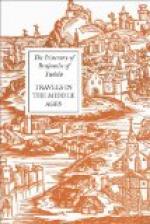Thence it is two days to Mosul, which is Assur the Great, and here dwell about 7,000 Jews, at their head being R. Zakkai the Nasi of the seed of David, and R. Joseph surnamed Burhan-al-mulk, the astronomer to the King Sin-ed-din, the brother of Nur-ed-din, King of Damascus[118]. Mosul is the frontier town of the land of Persia.
[p.53]
It is a very large and ancient city, situated on the river Hiddekel (Tigris), and is connected with Nineveh by means of a bridge. Nineveh is in ruins, but amid the ruins there are villages and hamlets, and the extent of the city may be determined by the walls, which extend forty parasangs to the city of Irbil[119]. The city of Nineveh is on the river Hiddekel. In the city of Assur (Mosul) is the synagogue of Obadiah, built by Jonah; also the synagogue of Nahum the Elkoshite[120].
Thence it is a distance of three days to Rahbah, which is on the river Euphrates. Here there are about 2,000 Jews, at their head being R. Hezekiah, R. Tahor and R. Isaac. It is a very fine city, large and fortified, and surrounded by gardens and plantations.
Thence it is a day’s journey to Karkisiya which is Carchemish, on the river Euphrates. Here there are about 500 Jews, at their head being R. Isaac and R. Elhanan. Thence it is two days to El-Anbar which is Pumbedita in Nehardea[121]. Here reside 3,000 Jews, and amongst them are learned men, at their head being the chief rabbi R. Chen, R. Moses and R. Jehoiakim. Here are the graves of Rab Jehuda and Samuel, and in front of the graves of each of them are the synagogues which they built in their lifetime. Here is also the grave of Bostanai the Nasi, the head of the Captivity, and of R. Nathan and Rab Nachman the son of Papa.
[p.54]
Thence it takes five days to Hadara, where about 15,000 Jews dwell, at their head being R. Zaken, R. Jehosef and R. Nethanel[122].
Thence it takes two days to Okbara, the city, which Jeconiah the King built, where there are about 10,000 Jews, and at their head are R. Chanan, R. Jabin and R. Ishmael.
Thence it is two days to Bagdad, the great city and the royal residence of the Caliph Emir al Muminin al Abbasi of the family of Mohammed. He is at the head of the Mohammedan religion, and all the kings of Islam obey him; he occupies a similar position to that held by the Pope over the Christians[123]. He has a palace in Bagdad three miles in extent, wherein is a great park with all varieties of trees, fruit-bearing and otherwise, and all manner of animals. The whole is surrounded by a wall, and in the park there is a lake whose waters are fed by the river Hiddekel. Whenever the king desires to indulge in recreation and to rejoice and feast, his servants catch all manner of’ birds, game and fish, and he goes to his palace with his counsellors and princes.
[p.55]




